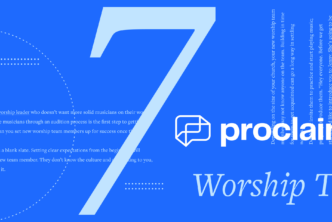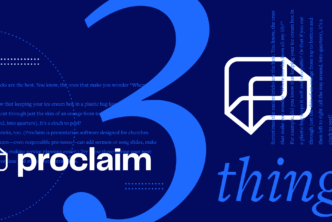Today’s guest post is by Susan Fontaine Godwin, founder and president of Christian Copyright Solutions—a leading authority on church-music copyrights. She is frequently featured in Christian magazines, where she equips teams and churches to honor copyright law and use the best materials available for their worship.
When I visit churches and teach about copyright issues, pastors and leaders often say they feel overwhelmed and confused. Without a clear strategy, it’s hard to know where to begin.
Pastors and leaders need to remember that copyright compliance doesn’t happen overnight. It’s a process. However, certain copyright infringements represent higher risks and can result in higher fines and fees, so it is important to address some critical issues right away. Here are four keys to help your church minimize risks and PLAN for compliance:
- Prepare a list of all the areas and types of activities in your church that use copyrighted material.
- Learn the basics of copyright law, as well as the blanket licenses that may provide coverage for your activities.
- Allow enough time to research and obtain permissions prior to copyright use.
- Never use copyrighted material without permission or exemption.
1. Prepare to obey the law from the ground up
With your church staff and volunteers, identify where and how copyrighted works are being used in the course of your church’s activities and services.
A good place to start is reviewing your website and focusing on any copyrighted materials on the site. Websites may contain several types of copyrights, including music, sound recordings, visual images, literary works, and audiovisuals. It’s a good idea to assign a gatekeeper to make sure no uncleared copyrighted materials are posted on your site. Websites make churches more visible—and more vulnerable.
2. Learn how US Copyright Law impacts churches
To get started, download this free fact sheet on Copyrights 101 from Christian Copyright Solutions (CCS). You may also want to engage a copyright professional or an attorney to advise your church on the important areas that impact your activities.
One of the best ways to become copyright compliant is to learn about all the available church blanket licenses, which provide churches with the simplest and most cost-efficient method to get copyright coverage. These licenses allow different uses and cover different works, so it’s important to understand what each license covers and what it does not cover. To make sure you’re in the clear, you can download CCS’ free fact sheet on blanket licenses.
3. Allow time to obtain permission and licenses
Not all copyrights and uses are covered by a blanket license. Acquiring specific permissions can take as long as four to eight weeks. It helps to incorporate copyright clearances into the creative process when you begin planning for special events. It’s also a good idea to include royalty or license fees in your creative budget.
Many churches appoint a copyright gatekeeper as the point person to make sure all copyrighted material has been cleared or is covered by a license. This works really well if senior leaders authorize the gatekeeper to make decisions and enforce policies.
4. Never use copyrighted material without permission
Whenever your church uses someone else’s materials, you have to be certain that you either have permission, or the use is covered by an exemption in the US Copyright Law; e.g., the Religious Service Exemption. It’s important for a church to include copyright compliance in its policies and procedures document for staff members. There are certain copyright uses that leave a church at higher risk. For example, churches have been sued for synchronizing a song and sound recording to their own original video or audiovisual material. Anything posted to your church’s website is highly visible, and there are companies that crawl websites looking for their copyrighted works.
It’s important to have a clear copyright compliance policy in place and to communicate that policy to all church employees and volunteers—because if an employee illegally uses copyrighted material, the church can also be held liable. Some churches build this policy into their employee contracts. In many cases, it’s advisable for a church to consult with an IP attorney for guidance in establishing their policies and procedures.
Often as I’m wrapping up an on-site church consultation, the church leaders’ first question is, “How are we doing?” They often ask what kind of grade I would give them. I guess it’s just human nature to want to know how we measure up or score on a particular subject.
We thought it would be fun to create a game you can play on your own without fear of judgment or recrimination. The copyright compliance report card is for entertainment purposes only, but along the way you’ll find some very useful information and practical ideas on how to become more compliant. It will take about five to ten minutes for you to answer 12 questions. When you’re done, you’ll get a grade and a summary report on specific categories to give you an idea of where you can find licensing solutions or consider making policy changes.
Play the game and see how you score. All the information is anonymous and no data is stored in the CCS system. And no, you will not get a call from the copyright police! However, if you have questions, you can live chat with one of our copyright solvers or call 1-555-5SOLVER. We are more than happy to help you learn how to obey the law, keep a clear conscience, and legally use the materials your church needs (Romans 13:5).
* * *
Proclaim automatically connects your presentations to your CCLI SongSelect account, so you can quickly assemble your presentations with songs that honor God and the artists that wrote them. Save time without ever violating copyright law, and put together beautiful services easier than ever. Download Proclaim today to try it free.




